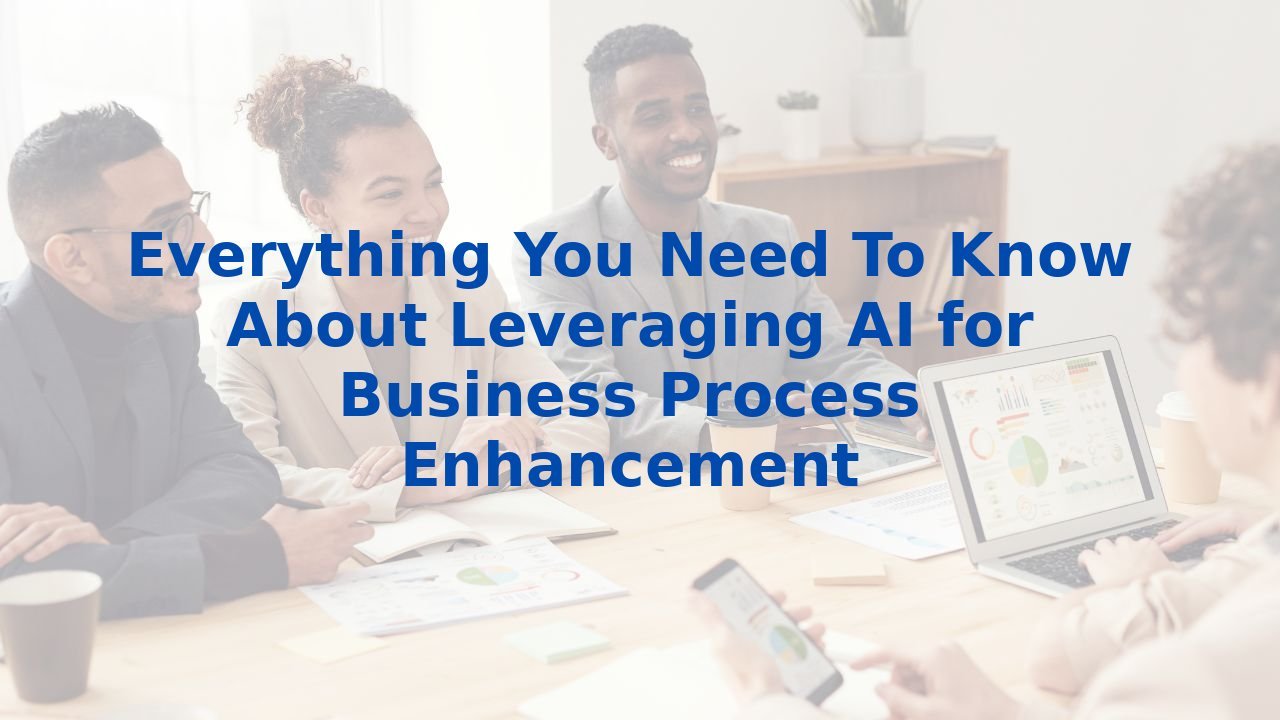Everything You Need To Know About Leveraging AI for Business Process Enhancement
Everything You Need To Know About Leveraging AI for Business Process Enhancement
In an era where innovation drives success, organizations are on a relentless pursuit to enhance their efficiency, reduce costs, and foster informed decision-making. Enter Artificial Intelligence (AI) — a catalyst for transformation that redefines business processes and revolutionizes operational workflows. This guide explores the myriad of ways AI can enhance your business processes and the profound benefits it brings to organizational efficiency.
1. Process Discovery and Mapping
AI is reshaping the foundational stage of business process improvement: process discovery and mapping. By employing advanced technologies such as process mining and natural language processing, AI effectively reveals existing workflows. This method goes beyond traditional approaches that often rely on laborious interviews and manual data assessments. Instead, AI sifts through vast arrays of operational data to unearth inefficiencies and identify bottlenecks hidden from human oversight. Organizations can unlock essential insights that pave the way for immediate improvements and streamline future operations.
2. Process Automation
One of AI's most striking advantages lies in its capability to automate repetitive tasks. This innovation significantly reduces human error and propels productivity. Imagine a scenario where time-consuming manual activities are swiftly handled by AI bots. Processes such as document processing become instantaneous and precise, freeing employees to concentrate on strategic tasks that require human intuition and creativity. This evolution not only saves valuable time but also elevates the overall accuracy of tasks, driving operational efficiency to new heights.
3. Decision-Making and Predictive Analytics
In a world inundated with data, AI emerges as a beacon for enhanced decision-making. Its strength lies in its capacity to analyze structured and unstructured data, distilling pertinent information to illuminate paths for optimal decisions. Furthermore, AI-powered predictive analytics grant organizations the foresight needed to navigate potential risks and forecast outcomes. This proactive approach to decision-making empowers businesses to swiftly respond to market shifts and align their strategies with real-time insights, fostering a culture of agility and responsiveness.
4. Customer Service and Experience
The customer experience is paramount in today's competitive landscape, and AI plays a crucial role in elevating service standards. Through chatbots that automate basic inquiries and sophisticated analysis of customer feedback, organizations can drastically enhance their service quality. AI streamlines incoming requests, extracts vital information, and integrates it into a comprehensive system for effective triage. This not only streamlines customer service operations but also curates a personalized and engaging experience, reinforcing brand loyalty and customer satisfaction.
5. Product Development and Innovation
AI is altering the trajectory of product development, serving as an architect of innovation. With tools that employ generative design, organizations can input parameters for desired products and let AI explore countless design possibilities. This leads to remarkable efficiencies, cutting down on costly prototypes that fail to meet requirements. Moreover, the ability to analyze vast datasets allows businesses to spot trends that inform smarter decisions and innovative product creation — a game-changer in a fast-evolving market landscape.
6. Continuous Improvement
Continuous improvement is the lifeblood of operational excellence, and AI is integral to its realization. By providing ongoing feedback and data-driven recommendations, AI aids organizations in optimizing processes iteratively. This data-centric approach ensures that performance enhancements are not just one-time fixes, but rather a consistent evolution aligned with industry standards and organizational objectives. Embracing this iterative feedback loop fosters sustained growth and keeps businesses ahead of the curve.
The Benefits of Training Employees for AI
While the technology itself is revolutionary, the true power of AI is unlocked through effective training for your employees. When an organization invests in raising AI competence among its workforce, the returns can be exponential:
- Enhanced Decision-Making Skills: Employees equipped with AI knowledge can decipher data insights, leading to astute decision-making.
- Improved Efficiency: A trained staff can seamlessly automate tasks, enabling them to dedicate time to more strategic initiatives.
- Increased Adaptability: Familiarity with AI tools fosters a workforce capable of quickly adapting to technological advancements.
- Better Collaboration: Skilled employees collaborate effectively with AI systems, creating a synergistic interface that maximizes efficiency.
Conclusion
AI stands as a transformative force across business processes, enhancing everything from mapping and automation to decision-making and continuous improvement. The profound impact of AI on operational efficiency cannot be overstated; the potential for increased productivity, reduced costs, and improved decision-making awaits those ready to embrace it. By ensuring that employees are adequately trained in these technologies, organizations can maximize their benefits and maintain a competitive edge in today's dynamic market.
For further resources on how to equip your entire workforce with AI skills, consider exploring available training options and insights on Complete AI Training.



